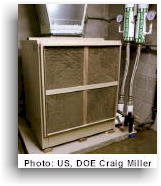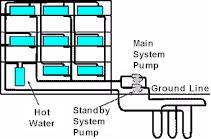Why a Geothermal Heat Pump?
GHPs Offer Many Benefits
GHPs Have Low Environmental Impact
Financing a GHP System
Design and Installation
Geothermal heat pumps are one of the most efficient ways to heat and cool a home and provide hot water. More and more homeowners are discovering the benefits of these systems, which tap the relatively constant temperature of the Earth a few feet underground, for both new homes and retrofits in existing houses.  | Why a Geothermal Heat Pump?
The installation of a heating or cooling system is a decision that will affect a homeowner's comfort—and pocketbook—for years to come. One option to think about is a geothermal heat pump (GHP), which is one of the most cost-effective and longest-lasting heating and cooling systems on the market. Plus, GHPs provide free hot water as a byproduct of air conditioning for the household in the summer. Also known as ground-source heat pumps or GeoExchange systems, GHPs provide many benefits to the homeowner in both new and retrofit situations. |
Surveys by utilities illustrate a high level of satisfaction with GHPs compared to conventional systems. In fact, more than 95% of all GHP users would recommend a similar system to their friends and family. According to the Environmental Protection Agency (EPA), GeoExchange systems are the most energy- efficient, environmentally clean, and cost-effective space conditioning systems available. Simply put, a GHP system moves the heat from the earth (or a groundwater source) into the home in the winter, and pulls the heat from the house and discharges it into the ground in the summer. The underground (or underwater) piping loops serve as a heat source in the winter and a heat sink in the summer. 
While many parts of the country experience seasonal temperature extremes—from scorching heat in the summer to sub-zero cold in the winter—a few feet below the earth's surface the ground remains at a relatively constant temperature. Depending on latitude, ground temperatures range from 45°F (7°C) to 75°F (21°C). Like a cave, this ground temperature is warmer than the air above it during the winter and cooler than the air in the summer. The GHP takes advantage of this by exchanging heat with the earth through a ground heat exchanger rather than with the outside air as with air conditioners. GHPs Offer Many Benefits
In even the coldest climates, geothermal heat pumps offer cost savings, durability, low maintenance, year-round comfort, and other benefits. Cost Effective
Geothermal heat pumps save money in operating and maintenance costs. While the initial purchase price of a residential GHP system is often higher than that of a comparable gas-fired furnace and central air-conditioning system, it is more efficient, thereby saving money every month. For further savings, GHPs equipped with a device called a "desuperheater" can heat the household water. In the summer cooling period, the heat that is taken from the house is used to heat the water for free. In the winter, water heating costs are reduced by about half. On average, a geothermal heat pump system costs about $2,500 per ton of capacity, or roughly $7,500 for a 3-ton unit (typical residential size). In comparison, other systems would cost about $4,000 with air conditioning. When the cost is included in the mortgage, the homeowner has a positive cash flow from the beginning. For example, say that the extra $3,500 will add $30 per month to each mortgage payment. But the energy cost savings will easily exceed that added mortgage amount over the course of each year. On a retrofit, the GHP's high efficiency typically means much lower utility bills, allowing the investment to be recouped in two to ten years. In addition, some electric utilities have financing packages that make the purchase of a GHP system even less expensive. Other utilities are providing special electric rates for homes with GHP systems installed. Durability
Because they use fewer mechanical components, and because those components are sheltered from the elements, leaves, dirt, and possible vandalism, geothermal heat pumps are durable and highly reliable. The underground piping used in the system often has 25- to 50-year warranties, and the GHPs themselves typically last 20 years or more. Low Maintenance
Geothermal heat pump systems have fewer maintenance requirements than most other systems. When properly installed, the underground components are virtually worry free. The components in the living space are easily accessible, which increases the convenience factor and helps ensure that the upkeep is done on a timely basis. Year-Round Comfort
Like the typical forced-air furnace or central air-conditioning system, a GHP system uses ductwork. A two-speed GHP system is so quiet inside a house that users do not know it is operating because there are no tell-tale blasts of cold or hot air, depending on whether it's the heating or cooling season. GHPs also improve humidity control by maintaining about 50% relative indoor humidity, making GHPs very effective in humid areas. Quiet Operation
With GHPs, there are no outside condensing units like air conditioners, so there's no concern about A/C noise near patio areas or decks, or bothering the neighbors with the constant hum of a conventional air conditioner. GHPs Have Low Environmental Impact
Because a GHP system is so efficient, it uses a lot less energy to maintain comfortable indoor temperatures. This means that less energy—often created from burning fossil fuels—is needed to operate a GHP. According to the EPA, geothermal heat pumps can reduce energy consumption—and corresponding emissions—up to 44% compared to air-source heat pumps and up to 72% compared to electric resistance heating with standard air-conditioning equipment. Financing a GHP System
Many geothermal heat pump systems carry the DOE and EPA ENERGY STAR® label. ENERGY STAR®-labeled equipment can now be financed with special ENERGY STAR® loans from banks and other financial institutions. The goal of the loan program is to make ENERGY STAR® equipment easier to purchase, so these loans were created with attractive terms. Some loans have lower interest rates, longer repayment periods, or both. Ask your contractor about ENERGY STAR® loans or call the EPA's ENERGY STAR® toll-free hotline at 1-888-STAR-YES for a list of financing options. Another way to help finance the purchase of a GHP system is to roll the cost into an "energy-efficient mortgage" that would cover this and other energy-saving improvements to the home. The additional cost can be combined into the mortgage and will produce a positive cash flow. Banks and mortgage companies can provide more information on these types of loans. Design and Installation
Installing a geothermal heat pump system is not a project for the do-it-yourselfer. Because the pipes are underground, they need to be designed and installed correctly, and properly pressure tested. The consumer should insist that a qualified and experienced contractor, who has received training at a recognized institution, install the system.
Source: EREN Geothermal Energy Program: Geothermal Heat Pumps Make Sense for Homeowners | 

